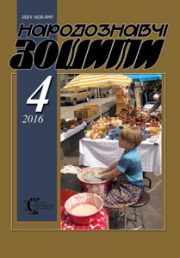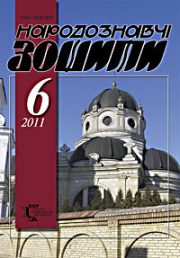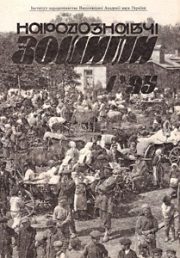The Ethnology Notebooks. 2024. № 4 (178), 865—873
UDK [930.2:355.48(470+570:477)”2022/2024″]:177.7
DOI https://doi.org/10.15407/nz2024.04.865
KRYKUN Yulia
- ORCID ID: https://orcid. org/0000-0002-0175-4352
- Candidate of Historical Sciences,
- Head of the Art History and Folklore Department,
- State Scientific Center for the Protection of Cultural Heritage
- from man-made disasters,
- 56, ave. Beresteyskyi, 03056, Kyiv, Ukraine,
- Contacts: e-mail: juliya.s.krykun@gmail.com
Abstract. In the course of certain historical circumstances, especially cataclysms (in the conditions of wars, famines, technological disasters, etc.), there is a change in the norms of behavior, interpersonal relations, a change in values and life priorities. People behave differently in extreme situations, in particular, in conditions of war, but it is obvious that there is an actualization of the customs of mutual support. We all witnessed the war, but most of all the difficulties were felt by the displaced persons — internal and temporarily displaced persons who are forced to adapt to the new environment, etc., and most of all those who survived the occupation and adapted to new, sometimes extremely difficult, living conditions: «In the twenty-first century we will again hide in basements, cook at the stake and see so much destruction, death!». Now it is important to find common and different experiences of experiencing the war of those who stayed at home and had to migrate to other countries, saving their lives and their relatives.
The aim of the article is to try to characterize changes in moral and ethical values and social norms, in particular, on the example of experiencing the modern Russian-Ukrainian war within the country (in the occupied territory) and outside it (Poland). The article also provides a brief overview of the results of the impact of the war in the following main spheres of life: social, family and religious.
The main methods of research: oral history, autobiographical, systematization, historical and comparative.
Keywords: oral history, occupation, migration, norms of behavior, collective support, family, moral and ethical values, Ukrainians.
Received 5.07.2024
REFERENCES
- Grinchuk, M. (2024, 01.06.). «What if you want to record something?». Electronic scientific journal: Ukraine Modern. In the Whirlpool of war. In the Thunderstorm of War. Ukraine is modern [in Ukrainian].
- Telypska, O. (2022). Running сan’t stay: stories of Ukrainian refugees in their own country. Kharkiv: Folio [in Ukrainian].
- Demel, Gr., & Trzeszczynska, Р. (2024). Forming a Ukrainian Diaspora in Poland: Between «Common Culture», National Naturalism, and Othering. Nationalities Papers (Pp. 1—20) [in Polish].
- Demel, Gr. (2023). They came. Will they stay? Selected narratives about Ukrainians in Poland and the concept of moral panic. Political Science Studies. Studies and analyses (Issue 68, pp. 271—296) [in Polish].
- Pankova, A., & Boriak, O. (2022). «…This is the war, this is murder of peaceful civilians. . . »: Chernihiv neighborhood’s residents about the peculiarities of everyday life during the Russian offensive and life under occupation. Ukrainian Historical Journal (Issue 6, pp. 30—47) [in Ukrainian].
- Vasyanovych, O. (2024). «I was afraid that if they killed me first, then who would cook for my father»: the story of the resident of Polissia village, Chernihiv region, about life under the occupation. Ukrainian Historical Journal (Issue 2, pp. 39—57) [in Ukrainian].
- Berezovska, O., & Berezovska, V. (2023, 27.06.). «It’s scary when children want to eat, and you can’t give anything»: children’s everyday life in the conditions of the Russian-Ukrainian war. Ukraine is modern. In the Thunderstorm of War [in Ukrainian].
- Makhovska, S. (Ed.). (2023). War, science and emotions: (un) new concepts and approaches: Collection of round table materials (Chernihiv, February 21—22, 2023). Kyiv: Yurka Lyubchenka [in Ukrainian].
- Logvynenko, B. (2023). De-occupation. Stories of Ukrainian resistance. 2022. Kyiv: Ukrainer [in Ukrainian].
- Krykun, Y. Author’s collections of field audio recordings. Recorded from a resident of Kozarovychi, Vyshhorod district, Kyiv region. 8 August, 2022 [in Ukrainian].
- Krykun, Y. Author’s collections of field audio recordings. Recorded by Elena, 41, Warsaw, Poland. 8 February, 2024 [in Ukrainian].
- Krykun, Y. Author’s collections of field audio recordings. Recorded from a resident of Bucha, Kyiv region. 14 April, 2022 [in Ukrainian].
- Krykun, Y. Author’s collections of field audio recordings. Recorded from a resident of Borodyanka, Bucha district, Kyiv region. 25 April, 2022 [in Ukrainian].
- Krykun,Y. Author’s collections of field audio recordings. Recorded from a resident of Kherson on April 25, 2023 [in Ukrainian].
- Krykun, Y. Author’s collections of field audio recordings. Recorded from a resident of Vorzel, Bucha district, Kyiv region. September 24, 2022 [in Ukrainian].
- Museum & Archive of folk culture of Ukrainian Polissia of State scientific center for protection of cultural heritage from technological disasters. Chernihiv-2018, recorded by Y. Krykun from Dniprovske, Chernihiv district, Chernihiv region [in Ukrainian].
- Krykun, Y. Author’s collections of field audio recordings. Recorded (1) from a resident of Makariv, Bucha district, Kyiv region. 18 April, 2022 [in Ukrainian].
- Krykun, Y. Author’s collections of field audio recordings. Recorded from a resident of Irpin, Kyiv region. 2 April, 2022 [in Ukrainian].
- Krykun, Y. Author’s collections of field audio recordings. Recorded (2) from a resident of Makariv, Bucha district, Kyiv region. 18 April, 2022 [in Ukrainian].
- Krykun, Y. Author’s collections of field audio recordings. Recorded by Alla, 52, Warsaw, Poland. 9 February, 2024 [in Ukrainian].
- Krykun, Y. Author’s collections of field audio recordings. Recorded by Natalia, 37, Warsaw, Poland. 11 February, 2024 [in Ukrainian].
- Krykun, Y. Author’s collections of field audio recordings. Record from a priest fromBorodyanka, Bucha district, Kyiv region. 24 April, 2022 [in Ukrainian].
- Krykun, Y. Author’s collections of field audio recordings. Recorded from residents of Ivankiv, Vyshhorod district, Kyiv region. April 18, 2022 [in Ukrainian].
- Krykun, Y. Author’s collections of field audio recordings. Recorded by Natalia, 35, Warsaw, Poland. 7 February, 2024 [in Ukrainian].
- Krykun, Y. Author’s collections of field audio recordings. Recorded by Eugenia, 40, Warsaw, Poland. 10 February, 2024 [in Ukrainian].






